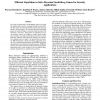533 search results - page 25 / 107 » Playing games with approximation algorithms |
AAAI
2008
13 years 11 months ago
2008
In a class of games known as Stackelberg games, one agent (the leader) must commit to a strategy that can be observed by the other agent (the adversary/follower) before the advers...
ISAAC
2009
Springer
14 years 3 months ago
2009
Springer
We consider some well-known families of two-player zero-sum perfect-information stochastic games played on finite directed graphs. Generalizing and unifying results of Liggett and...
AIIDE
2007
13 years 11 months ago
2007
Star-Kick is a commercially available and fully automatic table soccer (foosball) robot, which plays table soccer games against human players on a competitive level. One of our re...
ATAL
2004
Springer
14 years 2 months ago
2004
Springer
In order to succeed, agents playing games must reason about the mechanics of the game, the strategies of other agents, other agents’ reasoning about their strategies, and the ra...
SODA
2004
ACM
13 years 10 months ago
2004
ACM
We study perfect-information stochastic parity games. These are two-player nonterminating games which are played on a graph with turn-based probabilistic transitions. A play resul...

